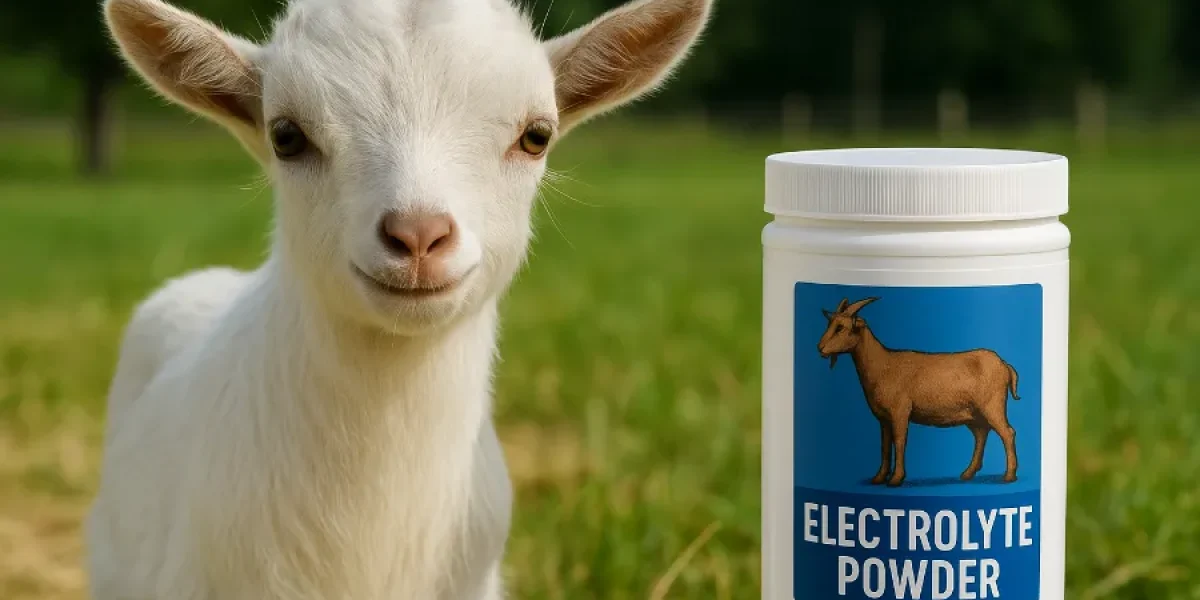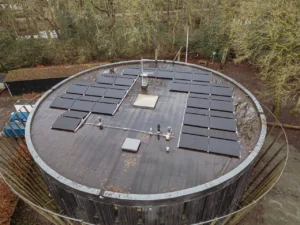When you raise goats long enough, you learn one golden rule: water isn’t always enough. Goats can lose fluids fast — during a heatwave, after kidding, or when scours hit — and when they do, plain water won’t bring them back to balance. That’s when goat electrolytes become a real lifesaver.
Electrolytes replace the essential minerals goats lose when dehydrated — things like sodium, potassium, and chloride — while helping their bodies absorb water more efficiently. If you’ve ever had a goat go off feed, look dull-eyed, or seem weak after a hot day, the right electrolyte mix can make all the difference.
In this post, I’ll walk you through my tried-and-true approach to rehydration and share my Top 10 best electrolyte mixes for goats, including natural, organic, and store-bought options — ranked from best to last.
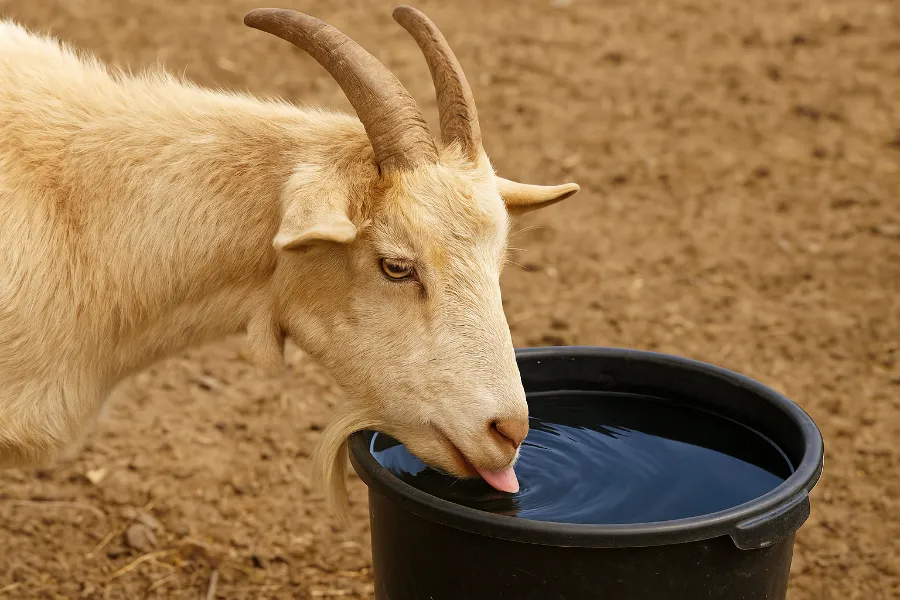
Goat Care: Why Electrolytes Are Essential
Every goat keeper eventually faces it — that one doe or kid that just looks “off.” They may still nibble hay, but you know something’s wrong. Nine times out of ten, it’s dehydration.
Goats can lose fluids for a variety of reasons:
- Heat stress and sweating during summer
- Scours (diarrhea) from parasites, diet changes, or illness
- Kidding or nursing
- Transport stress
- Reduced water intake in cold weather
Electrolytes don’t just quench thirst — they help restore mineral balance so the body can properly use the water it drinks. Without that mineral balance, dehydration lingers even if your goat drinks gallons.
So in your regular goat care routine, keep electrolytes on hand just like you would dewormers or mineral supplements.
Electrolyte Powder: The Quick and Convenient Fix
If you don’t have time to mix ingredients, a commercial electrolyte powder made for goats is your best friend. These ready-to-use mixes are balanced with sodium, potassium, sugar, and buffering agents like acetate or bicarbonate.
They’re easy to scoop, dissolve quickly in warm water, and are perfect when you’re treating multiple animals at once. Most powders can be offered for 12–24 hours during recovery and then swapped out for fresh water.
The beauty of electrolyte powder is convenience — there’s no measuring errors, and it’s consistent every time. The only downside? Some goats are picky drinkers, so a little flavor encouragement (like honey or molasses) sometimes helps.
Homemade Electrolytes: The DIY Solution That Works
For those of us who love practical homesteading, homemade electrolytes are an empowering and budget-friendly alternative. With a few pantry staples, you can mix a batch anytime.
Here’s my go-to formula — one that’s saved many of my goats over the years:
Homemade Goat Electrolyte Recipe (per 1 liter of warm water):
- ½ teaspoon table salt (sodium chloride)
- ¼ teaspoon Lite Salt (potassium chloride)
- ½ teaspoon baking soda (sodium bicarbonate — acts as a buffer)
- 2 tablespoons sugar, honey, or dextrose
Mix thoroughly until dissolved, and offer it warm in a clean bucket.
This simple formula provides sodium, potassium, and energy — the same essentials as commercial mixes, but homemade. I like to keep all these ingredients in a labeled “goat health” box so I can mix it on the spot.
For goats that turn their noses up at new smells, add a tablespoon of molasses or make a “hay tea” base (more on that later).
Goat Scours Treatment: Electrolytes to the Rescue
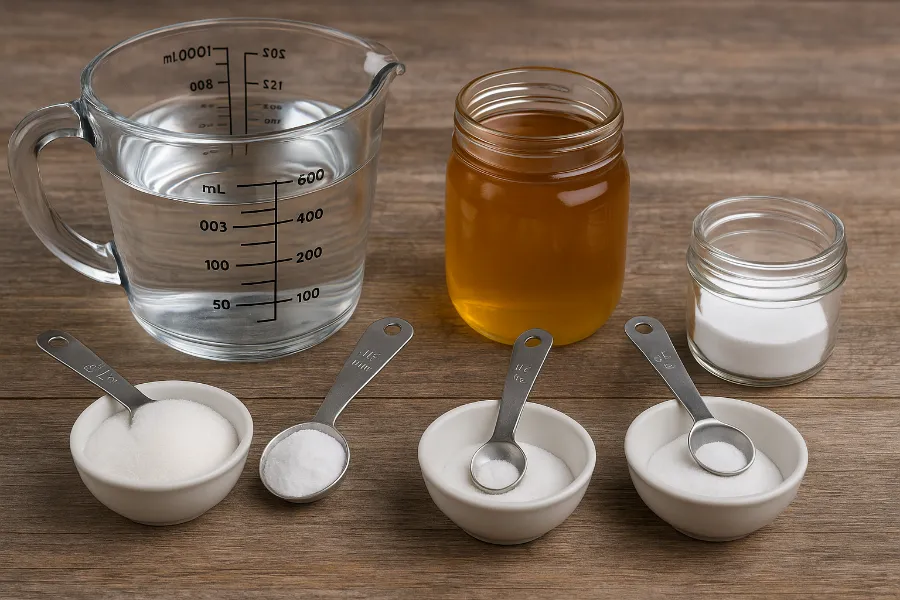
Scours (diarrhea) is one of the biggest causes of dehydration in goats, especially kids. When goats lose fluids this way, it’s not just water they’re losing — it’s essential minerals and energy.
Here’s how I handle goat scours treatment at home:
- Separate the goat to prevent spread and monitor intake.
- Offer electrolytes every few hours for 12–24 hours.
- Alternate milk and electrolyte feedings in kids — never mix the two.
- Add a probiotic supplement to support gut recovery.
- Keep bedding dry, and check for parasites or dietary causes.
When treated early, most goats bounce back fast. But if dehydration persists or scours worsen, it’s time to call the vet.
The Best Electrolyte Mix for Dehydrated Goats
(Top 10 Ranked: Natural, Organic, and Inorganic Options)
Here’s my personal ranking, based on years of experience and practical results.
1. Balanced DIY Goat ORS (Oral Rehydration Solution)
My #1 choice — effective, cheap, and quick to make. This mix covers sodium, potassium, and buffer needs while adding a touch of energy. Use it for scours, heat recovery, and general dehydration.
2. Goat-Specific Electrolyte Powder
A must-have for any serious keeper. It’s consistent, easy, and reliable — especially if you manage a herd or can’t always mix by hand.
3. Calf Electrolyte Powder (Goat-Safe)
If goat-specific powders aren’t available, a non-medicated calf formula does the trick. Make sure it contains dextrose and an acetate or citrate buffer for safe rehydration.
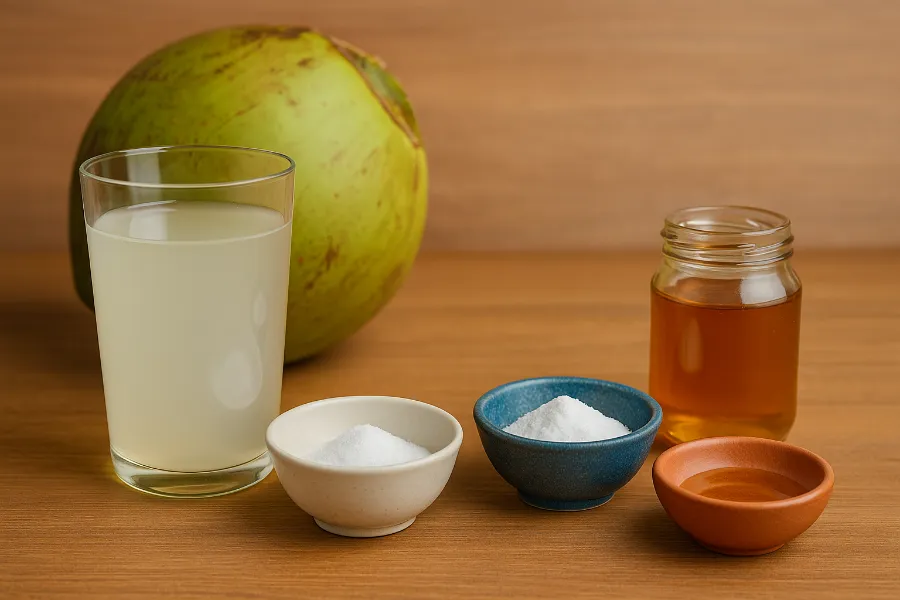
4. Coconut Water ORS (Natural and Organic Option)
For a natural twist, use coconut water as your base. Mix half coconut water and half plain water, then add ½ tsp salt and a small pinch of baking soda. It’s high in potassium and palatable for picky goats.
5. Electrolyte + Probiotic Combo
Perfect when dehydration stems from gut upset. The probiotics help rebuild healthy bacteria while the electrolyte restores hydration.
6. Molasses-Lite Salt Mix
A sweet, natural energy boost. Goats love molasses, and Lite Salt provides potassium. This one’s excellent for picky drinkers or goats coming off a hard kidding.
Recipe:
1 tbsp molasses + ½ tsp salt + ¼ tsp Lite Salt + ⅛ tsp baking soda per 1 liter water.
7. Hay Tea Electrolyte Base
For goats that refuse new flavors, make a comforting “hay tea.” Steep a handful of their regular hay in hot water, strain, cool, and add your electrolyte mix. It smells familiar and encourages drinking.
8. Electrolyte Drench or Gel
A fast fix for one goat that won’t drink on its own. These ready-made doses go straight into the mouth — perfect for a weak kid or a doe right after kidding.
9. Basic Salt-Sugar Water
Your emergency fallback: ½ teaspoon salt + 6 teaspoons sugar per liter of water. It won’t replace potassium or buffers, but it’s better than nothing when you’re caught unprepared.
10. Plain Water + Free-Choice Minerals
This isn’t an electrolyte solution, but it’s your first defense. Keeping clean water, mineral mixes, and free-choice baking soda available daily helps prevent many dehydration issues before they start.
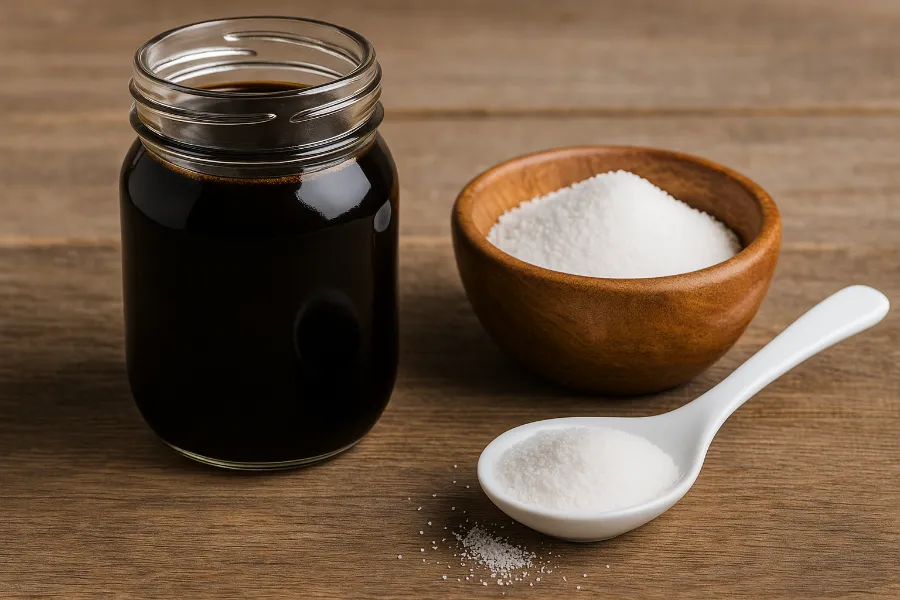
How to Use Goat Electrolytes Effectively
- Adults (100–150 lbs): Offer 1–2 liters over 4 hours, alternating with plain water.
- Kids (10–30 lbs): 100–250 mL several times a day.
- Post-kidding does: 1–2 liters warm electrolyte water right after birth.
- During heat waves: Provide in the morning and switch to plain water later in the day.
Always use clean buckets, and offer electrolytes warm, not cold — goats drink more readily that way.
Homemade Electrolytes: Quick Reference Chart
| Type | Ingredients (per liter) | Best For |
|---|---|---|
| Balanced ORS | Salt, Lite Salt, baking soda, sugar | General dehydration |
| Coconut Mix | Coconut water, salt, baking soda | Organic/natural herds |
| Molasses Mix | Molasses, salt, Lite Salt, baking soda | Picky goats |
| Salt-Sugar Water | Salt, sugar | Emergency use |
Recognizing Dehydration in Goats
Watch for:
- Sunken eyes
- Dry mouth or gums
- Skin that stays “tented” when pinched
- Weakness or dull behavior
- Reduced feed intake
At the first sign, act fast — goats can decline quickly. Electrolytes are most effective early on, before severe dehydration sets in.
Natural vs. Inorganic Electrolyte Mixes
Both have their place:
- Natural/Organic Electrolytes (like coconut water or molasses blends) are perfect for daily care, light dehydration, or holistic herds. They’re gentle and often more palatable.
- Inorganic/Commercial Electrolytes provide a precise mineral balance for serious dehydration. They’re stronger, faster, and more reliable during recovery.
My rule? Keep both. Use natural recipes for routine goat care and commercial powders for emergencies.
Troubleshooting Common Issues
My goat won’t drink it:
Try serving it warm, or mix with hay tea for a familiar smell. You can also drizzle in a teaspoon of honey or molasses.
Can I mix milk and electrolytes together?
No — always alternate feedings. Electrolytes interfere with milk digestion.
Can I give electrolytes every day?
Only during stress, illness, or heat. Long-term use can unbalance minerals.
When should I call the vet?
If your goat is too weak to stand, has persistent scours, or won’t drink anything — professional care and fluids are essential.
Goat Care: Keeping Hydration a Habit
Electrolytes aren’t just a cure — they’re prevention. Make it part of your goat care routine to:
- Keep multiple clean water sources.
- Offer minerals year-round.
- Watch goats closely during extreme weather.
- Have a small electrolyte stash ready for emergencies.
When hydration is managed proactively, your goats stay stronger, eat better, and recover faster.
Final Thoughts
I’ve learned over time that goat electrolytes are more than a quick fix — they’re part of a healthy herd’s foundation. Whether you prefer the precision of electrolyte powder or the simplicity of homemade electrolytes, the goal is the same: rehydrate fast and restore balance.
Start with the Balanced DIY Goat ORS, keep a commercial powder on hand, and never underestimate what a few warm liters of the right mix can do for a tired doe or scouring kid.
Hydration really is the quiet hero of good goat care — simple, overlooked, but absolutely vital.
FAQs
Goat electrolytes are mineral and salt solutions that help replace fluids lost from scours, heat, or stress. They maintain hydration, support muscle function, and prevent fatigue.
Use electrolytes during dehydration, after kidding, or in extreme heat. Offer for 12–24 hours, then switch back to fresh water once the goat is rehydrated.
Yes! Mix salt, Lite Salt, baking soda, and sugar or honey in warm water. This DIY formula works well for mild dehydration and is safe for most goats.
A balanced DIY ORS (oral rehydration solution) with sodium, potassium, and bicarbonate ranks highest. It restores fluids fast and uses simple ingredients.
Electrolytes replace water and minerals lost through diarrhea, keeping the goat hydrated while its gut recovers. Pair them with probiotics and clean bedding for faster healing.
Yes, many calf electrolyte powders are goat-safe if they’re non-medicated and contain sodium, potassium, and a buffer like acetate or citrate.
Check for sunken eyes, dry mouth, or a skin tent that stays up when pinched. A dull coat or weak posture also signal dehydration—offer electrolytes immediately.

